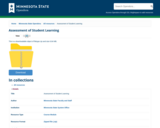
This is a downloadable object of filetype zip and size 6.84 MB.
- Subject:
- Education
- Material Type:
- Module
- Provider:
- Minnesota State Opendora
- Date Added:
- 11/23/2020

This is a downloadable object of filetype zip and size 6.84 MB.
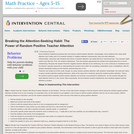
Some students misbehave because they are trying to attract teacher attention. Surprisingly, many students who value adult attention don't really care if it is positive (praise) or negative attention (reprimands)--they just want attention!
Unfortunately, instructors with students who thrive on teacher attention can easily fall into a 'reprimand trap.' The scenario might unfold much like this: First, the student misbehaves. Then the teacher approaches the student and reprimands him or her for misbehaving. Because the student finds the negative teacher attention to be reinforcing, he or she continues to misbehave-and the teacher naturally responds by reprimanding the student more often! An escalating, predictable cycle is established, with the student repeatedly acting-out and teacher reprimanding him or her.
Teachers can break out of this cycle, though, by using 'random positive attention' with students. Essentially, the instructor starts to ignore student attention-seeking behaviors, while at the same time 'randomly' giving the student positive attention. That is, the student receives regular positive teacher attention but at times unconnected to misbehavior. So the student still gets the adult attention that he or she craves. More importantly, the link between student misbehavior and resulting negative teacher attention is broken.
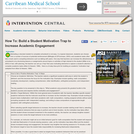
Motivating a reluctant student to complete schoolwork is not easy. In a typical classroom, students can choose from a number of sources of potential reinforcement (Billington & DiTommaso, 2003)--and academic tasks often take a back seat to competing behaviors such as talking with peers. One way that teachers can increase the attractiveness of schoolwork is by structuring lessons or assignments around topics or activities of high interest to the student (Miller et al., 2003).In fact, with planning, the teacher can set up a 'trap' that uses motivating elements to capture a student's attention to complete academic tasks (Alber & Heward, 1996). Here is a 6-step blue-print for building an academic 'motivation trap' (adapted from Alber & Heward, 1996).

Teachers strive to develop partnerships with parents to support student learning. Strong communication is fundamental to this partnership and to building a sense of community between home and school. This article provides a range of communication opportunities available to teachers, including the emergency use of technology. Barriers to communication are considered in conjunction with potential solutions.

Do you like teaching, but find yourself frustrated by how little students seem to learn? Would you like to try teaching, but are nervous about whether you will be any good at it? Are you interested in new research on science education? Research in science education shows that the greatest obstacle to student learning is the failure to identify and confront the misconceptions with which the students enter the class or those that they acquire during their studies. This weekly seminar course focuses on developing the participants' ability to uncover and confront student misconceptions and to foster student understanding and retention of key concepts. Participants read primary literature on science education, uncover basic concepts often overlooked when teaching biology, and lead a small weekly discussion session for students currently enrolled in introductory biology classes.
The instructor for this course, Dr. Julia Khodor, is a member of the HHMI Education Group.

Do you like teaching, but find yourself frustrated by how little students seem to learn? Would you like to try teaching, but are nervous about whether you will be any good at it? Are you interested in new research on science education? Research in science education shows that the greatest obstacle to student learning is the failure to identify and confront the misconceptions with which the students enter the class or those that they acquire during their studies. This weekly seminar course focuses on developing the participants' ability to uncover and confront student misconceptions and to foster student understanding and retention of key concepts. Participants read primary literature on science education, uncover basic concepts often overlooked when teaching biology, and lead a small weekly discussion session for students currently enrolled in introductory biology classes.
The instructor for this course, Dr. Kosinski-Collins, is a member of the HHMI Education Group.
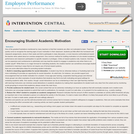
One of the greatest frustrations mentioned by many teachers is that their students are often not motivated to learn. Teachers quickly come to recognize the warning signs of poor motivation in their classroom: students put little effort into homework and classwork assignments, slump in their seats and fail to participate in class discussion, or even become confrontational toward the teacher when asked about an overdue assignment. One common method for building motivation is to tie student academic performance and classroom participation to specific rewards or privileges. Critics of reward systems note, however, that they can be expensive and cumbersome to administer and may lead the student to engage in academics only when there is an outside 'payoff.' While there is no magic formula for motivating students, the creative teacher can sometimes encourage student investment in learning in ways that do not require use of formal reward systems.
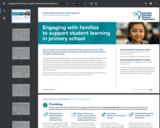
This guide makes recommendations based on the best available research evidence about how primary
school teachers and leaders can engage with families to bring about improvements in students’
learning outcomes. It sets out ‘promising’ and ‘not promising’ approaches drawn from multiple studies
which have measured the effects of different strategies. While there is room for improvements in the
quality of available research evidence,2 these approaches provide ‘best bets’ for guiding practice. This
guide also sets out next steps for considering how the findings relate to your individual practice or
whole school strategy.
Note that some of the examples offered may not apply in all contexts. Reasonable adjustments should
be made where necessary to ensure full access and participation for all families.
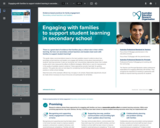
There is a great deal of evidence that families play a critical role in their child’s learning. So how can secondary school teachers best work with families to support student learning?
This guide makes recommendations based on the best available research evidence about how secondary school teachers and leaders can engage with families to bring about improvements in students’ learning outcomes.
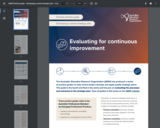
This guide is the fourth and final guide in the series and focuses on evaluating the processes and outcomes in the strategic plan.
Evaluation is central to strategic planning as it allows you to review what is and isn’t working on the school improvement journey. There are 2 types of evaluation you should consider:
Process evaluation examines whether practices have been applied in the way they were planned.
Outcome evaluation examines whether practices are having the desired effect on student learning.
Process and outcome evaluation both play key roles at different stages of a strategic plan’s life cycle.
This guide recommends practical steps for evaluating processes for improving practices, as well as the effect of these practices on student learning. We recommend reading this guide after you have read the third guide in this series, Selecting Practices to Deliver Improvement.
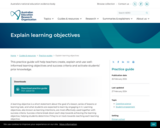
This practice guide will help teachers create, explain and use well-informed learning objectives and success criteria and activate students’ prior knowledge.
This practice guide will help you reflect and take action to develop your practice with a greater understanding of:
*the learning benefits when students understand the objectives of a lesson and how they can be successful
*specific techniques and strategies you can adopt to understand students’ prior knowledge, create well‑informed learning objectives and success criteria and use them effectively.
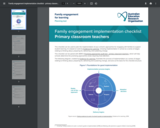
This checklist can be used to plan the implementation of your school’s approaches for engaging with families to support student learning. It is based on work by Evidence for Learning, showing implementation in school as a series of stages relating to thinking about, preparing for, delivering, and sustaining change.
This checklist can be paired with AERO’s Promising approaches audit tool - primary classroom teachers, which will help schools determine the promising approaches areas requiring most attention.
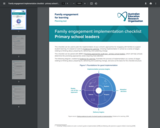
This checklist can be used to plan the implementation of your school’s approaches for engaging with families to support student learning. It is based on work by Evidence for Learning, showing implementation in school as a series of stages relating to thinking about, preparing for, delivering, and sustaining change.
This checklist can be paired with AERO’s Promising approaches audit tool - primary school leaders, which will help schools determine the promising approaches areas requiring most attention.
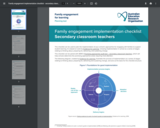
This checklist can be used to plan the implementation of your school’s approaches for engaging with families to support student learning. It is based on work by Evidence for Learning, showing implementation in school as a series of stages relating to thinking about, preparing for, delivering, and sustaining change.
This checklist can be paired with AERO’s Promising approaches audit tool – secondary classroom teachers, which will help schools determine the promising approaches areas requiring most attention.
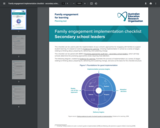
This checklist can be used to plan the implementation of your school’s approaches for engaging with families to support student learning. It is based on work by Evidence for Learning, showing implementation in school as a series of stages relating to thinking about, preparing for, delivering, and sustaining change.
This checklist can be paired with AERO’s Promising approaches audit tool – secondary school leaders, which will help schools determine the promising approaches areas requiring most attention.
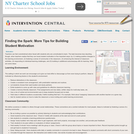
Teachers can feel overwhelmed when faced with students who are unmotivated to learn. The task becomes less daunting, though, when teachers realize that they can boost student motivation in five important ways: by (1) making positive changes to the learning environment, (2) fostering a sense of community in the classroom, (3) enhancing the interest of classroom activities, (4) responding to individual learning challenges, and (5) building in additional outcomes/pay-offs for learning. Here are some ideas:
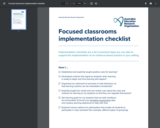
Implementation checklists are a list of practical steps you can take to support the implementation of an evidence-based practice in your setting.
This checklist focuses on implementing a focused classroom.
Have I...
* established and explicitly taught positive rules for learning?
* developed routines that signal to students when learning is ready to begin and how learning will happen?
* organised my classroom to promote on task behaviour so that learning routines can be embedded consistently?
*explicitly taught the verbal and non-verbal cues about the rules and routines for learning to my students so that they can regulate themselves?
*set learning goals for my students that are both ambitious but achievable? (Consult your formative assessment data and mastery learning objectives to help with this)
*explored various options for participation that enable all students to participate in class activities? (for example, different types of grouping).
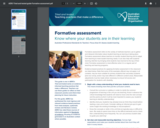
Formative assessment refers to the variety of methods teachers use to gather and interpret information about student learning as learning is taking place. Formative assessment allows teachers to monitor student learning and to adapt their teaching to meet student learning needs. It can also help with students’ learning retention by bringing what students have learned to the top of their mind. Formative assessment is most effective when it is a regular part of teaching and learning programs.
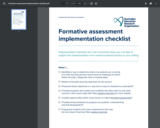
Implementation checklists are a list of practical steps you can take to support the implementation of an evidence-based practice in your setting.
This checklist focuses on formative assessment.
Have I...
* identified a way to determine where my students are currently at in their learning and the correct level of challenge for them? (either through a diagnostic task or existing data)
* written achievable learning objectives for the lesson?
* presented these objectives in a way that is easy for students to understand?
* provided students with models and scaffolds that allow them to see what success in this lesson looks like?
* created opportunities within every lesson to collect formative assessment?
* provided timely feedback to progress my students’ understanding and skill development?
* progressed students who have mastered the skill onto the next step of learning?
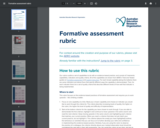
This rubric outlines a set of capabilities to do with the evidence-based practice of formative assessment. It can help teachers and their teams implement formative assessment by demonstrating a shared understanding of what it looks like in practice.